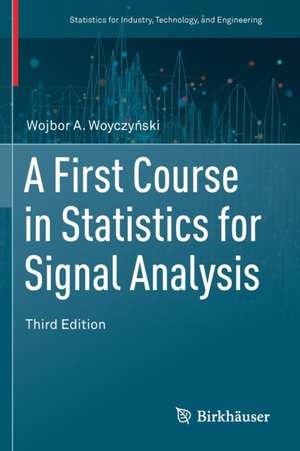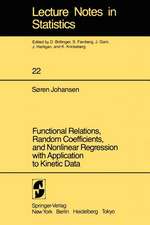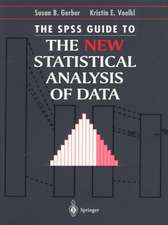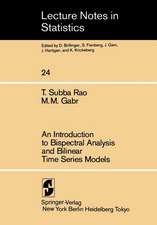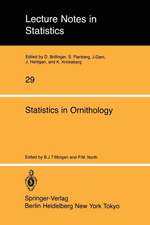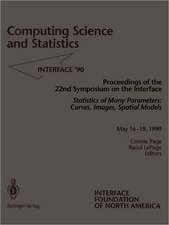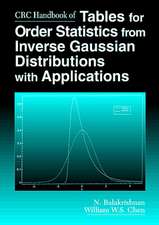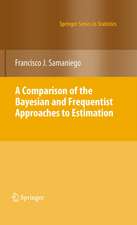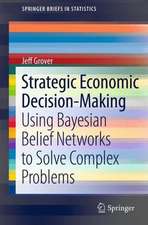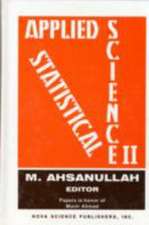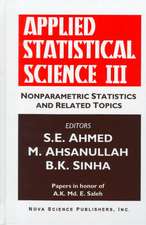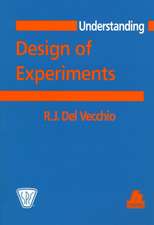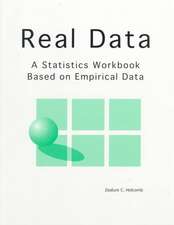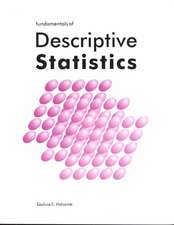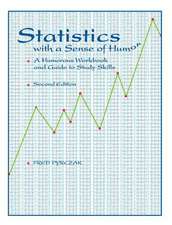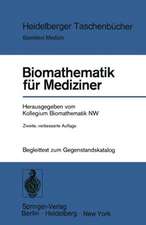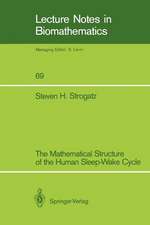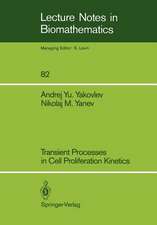A First Course in Statistics for Signal Analysis: Statistics for Industry, Technology, and Engineering
Autor Wojbor A. Woyczyńskien Limba Engleză Paperback – 17 oct 2020
Topics and Features:
· Fourier series and transforms—fundamentally important in random signal analysis and processing—are developed from scratch, emphasizing the time-domain vs. frequency-domain duality;
· Basic concepts of probability theory, laws of large numbers, the central limit theorem, and statistical parametric inference procedures are presented so that no prior knowledge of probability and statistics is required; the only prerequisite is a basic two–three semester calculus sequence;
· Computer simulation algorithms of stationary random signals with a given power spectrum density;
· Complementary bibliography for readers who wish to pursue the study of random signals in greater depth;
· Many diverse examples and end-of-chapter problems and exercises.
Developed by the author over the course of many years of classroom use, A First Course in Statistics for Signal Analysis, Second Edition may be used by junior/senior undergraduates or graduate students in electrical, systems, computer, and biomedical engineering, as well as the physical sciences. The work is also an excellent resource of educational and training material for scientists and engineers working in research laboratories. This third edition contains two additional chapters that present wavelets and the uncertainty principle, and the forecasting problems for stationary time series. These two topics are essential for students to attain a deeper understanding of statistical analysis of random signals.Reviews from previous editions:
A First Course in Statistics for Signal Analysis is a small, dense, and inexpensive book that covers exactly what the title says: statistics for signal analysis. The book has much to recommend it. The author clearly understands the topics presented. The topics are covered in a rigorous manner, but not so rigorous as to be ostentatious. JASA (Review of the First Edition)
This is a nicely written self-contained book and it is a good candidate for adoption as a textbook for upper-level undergraduate and even for a graduate course for engineering and physical sciences students. … I have no hesitation in recommending it as a textbook for the targeted course and audience. Technometrics, Vol. 53 (4), November, 2011 (Review of the Second Edition)
| Toate formatele și edițiile | Preț | Express |
|---|---|---|
| Paperback (1) | 473.81 lei 6-8 săpt. | |
| Springer International Publishing – 17 oct 2020 | 473.81 lei 6-8 săpt. | |
| Hardback (1) | 514.97 lei 38-44 zile | |
| Springer International Publishing – 17 oct 2019 | 514.97 lei 38-44 zile |
Preț: 473.81 lei
Preț vechi: 557.42 lei
-15% Nou
Puncte Express: 711
Preț estimativ în valută:
90.67€ • 94.09$ • 75.79£
90.67€ • 94.09$ • 75.79£
Carte tipărită la comandă
Livrare economică 17-31 martie
Preluare comenzi: 021 569.72.76
Specificații
ISBN-13: 9783030209100
ISBN-10: 3030209105
Pagini: 332
Ilustrații: XVIII, 332 p. 95 illus., 69 illus. in color.
Dimensiuni: 155 x 235 mm
Greutate: 0.49 kg
Ediția:3rd ed. 2019
Editura: Springer International Publishing
Colecția Birkhäuser
Seria Statistics for Industry, Technology, and Engineering
Locul publicării:Cham, Switzerland
ISBN-10: 3030209105
Pagini: 332
Ilustrații: XVIII, 332 p. 95 illus., 69 illus. in color.
Dimensiuni: 155 x 235 mm
Greutate: 0.49 kg
Ediția:3rd ed. 2019
Editura: Springer International Publishing
Colecția Birkhäuser
Seria Statistics for Industry, Technology, and Engineering
Locul publicării:Cham, Switzerland
Cuprins
Description of Signals.- Spectral Representation of Deterministic Signals: Fourier Series and Transforms.- Uncertainty Principle and Wavelet Transforms.- Random Variables and Random Vectors.- Stationary Signals.- Power Spectra of Random Signals.- Transmission of Stationary Signals through Linear Systems.- Optimization of Signal-to-Noise Ratio in Linear Systems.- Gaussian Signals, Covariance Matrices, and Sample Path Properties.- Spectral Representation of Discrete-Time Signals and Their Computer Simulations.- Prediction Theory for Stationary Random Signals.- Solutions to Selected Problems and Exercises.
Notă biografică
Wojbor A. Woyczyński is a Professor in the Department of Statistics and the Director of the Center for Stochastic and Chaotic Processes in Science and Technology at Case Western Reserve University. His research interests include probability theory, Lévy stochastic processes, random fields and their statistics, nonlinear, stochastic and fractional evolution equations, harmonic and functional analysis, random graphs, statistical physics and hydrodynamics, chaotic dynamics, applications to chemistry, physics, operations research, financial mathematics, medicine, oceanography, and atmospheric physics.
Textul de pe ultima copertă
This essentially self-contained, deliberately compact, and user-friendly textbook is designed for a first, one-semester course in statistical signal analysis for a broad audience of students in engineering and the physical sciences. The emphasis throughout is on fundamental concepts and relationships in the statistical theory of stationary random signals, explained in a concise, yet fairly rigorous presentation.
Topics and Features:
· Fourier series and transforms—fundamentally important in random signal analysis and processing—are developed from scratch, emphasizing the time-domain vs. frequency-domain duality;
· Basic concepts of probability theory, laws of large numbers, the central limit theorem, and statistical parametric inference procedures are presented so that no prior knowledge of probability and statistics is required; the only prerequisite is a basic two–three semester calculus sequence;
· Computer simulation algorithms of stationary random signals with a given power spectrum density;
· Complementary bibliography for readers who wish to pursue the study of random signals in greater depth;
· Many diverse examples and end-of-chapter problems and exercises.
Developed by the author over the course of many years of classroom use, A First Course in Statistics for Signal Analysis, Second Edition may be used by junior/senior undergraduates or graduate students in electrical, systems, computer, and biomedical engineering, as well as the physical sciences. The work is also an excellent resource of educational and training material for scientists and engineers working in research laboratories. This third edition contains two additional chapters that present wavelets and the uncertainty principle, and the forecasting problems for stationary time series. These two topics are essential for students to attain a deeper understanding of statistical analysis of random signals.
Reviews from previous editions:
A First Course in Statistics for Signal Analysis is a small, dense, and inexpensive book that covers exactly what the title says: statistics for signal analysis. The book has much to recommend it. The author clearly understands the topics presented. The topics are covered in a rigorous manner, but not so rigorous as to be ostentatious. JASA (Review of the First Edition)
This is a nicely written self-contained book and it is a good candidate for adoption as a textbook for upper-level undergraduate and even for a graduate course for engineering and physical sciences students. … I have no hesitation in recommending it as a textbook for the targeted course and audience. Technometrics, Vol. 53 (4), November, 2011 (Review of the Second Edition)
Topics and Features:
· Fourier series and transforms—fundamentally important in random signal analysis and processing—are developed from scratch, emphasizing the time-domain vs. frequency-domain duality;
· Basic concepts of probability theory, laws of large numbers, the central limit theorem, and statistical parametric inference procedures are presented so that no prior knowledge of probability and statistics is required; the only prerequisite is a basic two–three semester calculus sequence;
· Computer simulation algorithms of stationary random signals with a given power spectrum density;
· Complementary bibliography for readers who wish to pursue the study of random signals in greater depth;
· Many diverse examples and end-of-chapter problems and exercises.
Developed by the author over the course of many years of classroom use, A First Course in Statistics for Signal Analysis, Second Edition may be used by junior/senior undergraduates or graduate students in electrical, systems, computer, and biomedical engineering, as well as the physical sciences. The work is also an excellent resource of educational and training material for scientists and engineers working in research laboratories. This third edition contains two additional chapters that present wavelets and the uncertainty principle, and the forecasting problems for stationary time series. These two topics are essential for students to attain a deeper understanding of statistical analysis of random signals.
Reviews from previous editions:
A First Course in Statistics for Signal Analysis is a small, dense, and inexpensive book that covers exactly what the title says: statistics for signal analysis. The book has much to recommend it. The author clearly understands the topics presented. The topics are covered in a rigorous manner, but not so rigorous as to be ostentatious. JASA (Review of the First Edition)
This is a nicely written self-contained book and it is a good candidate for adoption as a textbook for upper-level undergraduate and even for a graduate course for engineering and physical sciences students. … I have no hesitation in recommending it as a textbook for the targeted course and audience. Technometrics, Vol. 53 (4), November, 2011 (Review of the Second Edition)
Caracteristici
Provides a wide audience with the fundamentals of statistical signal analysis in an accessible yet rigorous manner Includes two new chapters that present wavelets and the uncertainty principle, and the forecasting problems for stationary time series Considerably expands on previous editions with new examples, illustrations, and commentary Contains a large appendix with solutions of selected problems
